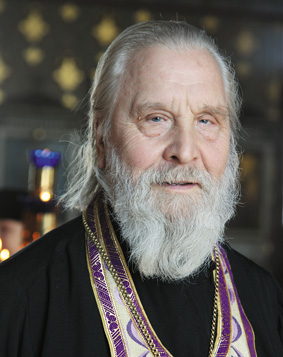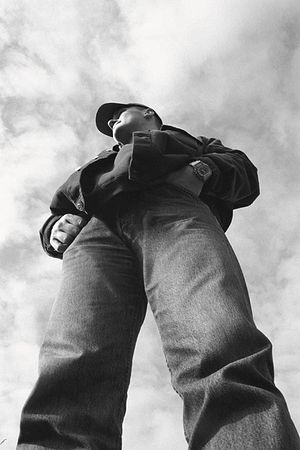Why it’s so habitual and natural for us to judge, how and why we should war with it, why Christ never judges anyone, and what should we do about the Last Judgment—Archpriest George Breyev (†29/04/2020, formerly the father-confessor to Moscow clergy, discussed this topic with Foma.ru in 2013.
 If we take a look at ourselves and try to see our own inclinations, then we can easily see that we already have a steady habit formed of judging.
If we take a look at ourselves and try to see our own inclinations, then we can easily see that we already have a steady habit formed of judging.
Priests who hear confessions very rarely encounter a person who could say, “I don’t judge anyone.” It’s nice to hear it, but such a state is basically an exception…
Judgment is a manifestation of our pride, due to which we consider ourselves qualified to judge another person. Self-aggrandizement is a quality of every person; it is deeply ingrained in all of us. The feeling of self-satisfaction, self-worth always warms us inwardly: “He is so good-looking, smart, but I’m even more good-looking and smart!” And such thoughts warm our souls. We are happy when we hear something pleasant said about us, but if someone dares to say something that contradicts our own self-opinion… Watch out! Some even become infuriated by this. “What did you say to me?!” The feeling of self-worth can be a strong stimulus for achieving many heights. It’s a powerful engine! But just the same, we know that it runs on fleshly, earthly energy. And we know what the scripture says: “God resists the proud”…
You can’t overcome the feeling of vainglory because it’s very strong. And if a person does not war with it, does not reject it, then the need naturally arises for judging others from you own high horse: “I’m so great and perfect, but imperfection is everywhere I look, and therefore I have the right to judge and hang a ‘label’ on everyone around me.” And so people start gathering to talk, to discuss how this person or that one lives. And they themselves don’t notice how they’ve begun to judge, and even justify themselves: “I’m not judging, I’m discussing.” But this kind of discussion always bears the inclination to picture another person in gloomy, dark colors.
Thus we begin to take upon ourselves what doesn’t belong to us—judgment. Moreover we rarely do this openly. For example, we look at someone and think to ourselves: “Ah ha, that guy is such-and-such a type, that’s how he is.” This is a slippery path and a mistaken opinion!
***
There is a very profound expression in Holy Scripture: For what man knoweth the things of a man, save the spirit of man which is in him? And: Even so the things of God knoweth no man, but the Spirit of God (1 Cor. 2:11). By this the Lord directly shows the depth inherent in a personality. You can’t know a person totally! Even if you thoroughly research his biography, there will nevertheless remain much that is hidden, which only he is capable of experiencing and feeling.
If this there is no depth in our approach to a human being, then all our thoughts about him are quite superficial. Therefore the Lord says outright: And why beholdest thou the mote that is in thy brother’s eye, but perceivest not the beam that is in thine own eye? Either how canst thou say to thy brother, Brother, let me pull out the mote that is in thine eye, when thou thyself beholdest not the beam that is in thine own eye? Thou hypocrite, cast out first the beam out of thine own eye, and then shalt thou see clearly to pull out the mote that is in thy brother’s eye (Lk. 6:41–42).
From the outside we can imagine a person in any light, but he is the only one who can truly and deeply know himself—that is, if he searches himself, if he wants to know himself—and not just as one of the millions, but he, himself, before the face of God. Because when we evaluate ourselves any other way—before other people, or proceeding from our own opinion—it seems to us that, yes, we really are something special, worthy, and of course, not criminals. As the Pharisee says, “I am not like other people. I fulfill God’s law, fast, and tithe.” This naturally “splashes out” of us. And it testifies to the fact that we do not have a deep knowledge of ourselves.
***
 A man’s knowledge of himself and God, it seems to me, is the source of non-judgment. It is given either by grace or as the result of podvig, inner work. But judgment happens because on the one hand, we don’t tend to seek deep knowledge of ourselves, and on the other hand, we haven’t come up to the level of repentance.
A man’s knowledge of himself and God, it seems to me, is the source of non-judgment. It is given either by grace or as the result of podvig, inner work. But judgment happens because on the one hand, we don’t tend to seek deep knowledge of ourselves, and on the other hand, we haven’t come up to the level of repentance.
Looking into yourself is the beginning of a spiritual process. The conscience gives one the knowledge of himself; and seeing himself, he can even get to the point of hatred: “I hate myself as I am! I don’t like myself as I am!” Yes, you’ve come closer to knowing yourself. It’s bitter, but this knowledge is perhaps the most important and essential in life. Because this is the starting point of repentance, an opportunity to regenerate your mind, to make a qualitative change in your relationship to yourself and the whole world—and first of all to your Creator.
Why has it been said that there is greater joy in heaven over one sinner who has repented then over a hundred righteous ones who have no need for repentance? Because it is hard but necessary to come to the following understanding: “It turns out that I am essentially no different from others; my essence comes from the old Adam, and I am by nature the same as my brother.”
But we do not want to know ourselves, to search ourselves with an investigative eye, because this requires the next step—the search for an answer to the question: “Where did that come from in me?” The fleshly resists the spiritual—this is the law of inner struggle. Therefore people choose what seems to be the more natural and simpler path—to look around, judge concerning others and not themselves. They are not aware that this brings them great harm…
***
When a person begins to wake up he understands that God Himself does not judge anyone. In the Gospel of St. John this is stated clearly: For God so loved the world, that he gave his only begotten Son, that whosoever believeth in him should not perish, but have everlasting life. For God sent not his Son into the world to condemn the world; but that the world through him might be saved (Jn. 3:16–17). It was imagined that the Messiah would be arrayed in royal authority and come to judge the nations as one having true divine judgment. But suddenly it turns out that God came not to judge us but to save us! This mystery is truly astonishing, it is amazing to us! And if God does not judge us, then who can judge?
Therefore judgment is an erroneous attitude of our consciousness, an erroneous idea that supposes we have authority. And if God Himself declines this authority? In Scripture it says that the Father gave judgment to the Son, and the Son says, “I did not come to judge you.”
But at the same time, the Lord does not hide the fact that there will be a Righteous Judgment, which, as Lermontov wrote, “The clinking of gold doesn’t reach.” God will manifest Himself, and in this appearance all creation will see itself as it really is. Now the Lord hides Himself because of our infirmity, our imperfection. But with the full revelation of God there will be nothing to hide. The books of the conscience will open, all secrets will be revealed, and man will give an answer for his every word. He that rejecteth me, and receiveth not my words, hath one that judgeth him: the word that I have spoken, the same shall judge him in the last day (Jn. 12:48). He shows that our idea of the judgment as a certain extraordinary, impersonal, authoritative proceeding—like in our earthly courts when a whole collegiate of judges gathers and studies huge volumes concerning a case then passes judgment—is not entirely correct. God will not pass judgment. He gives freedom; He always gives a person the opportunity to correct himself—to abandon unhealthy norms that bring happiness to neither you nor others. Thus, man is free to choose to the end.
They say that it is hard to fall under human judgment, because people can be very cruel in their judgments. They can be fundamentally cruel: Once they’ve passed sentence on you, just try to change public opinion about youreself! But God’s judgment is merciful, because the Lord wants to justify man: I have no pleasure in the death of the wicked; but that the wicked turn from his way and live (Ez. 33:11).
***
It is difficult for us not to trespass the boundary between judgment of a person and judgment of a deed! But it’s been said: Do not judge a person’s self; do not judge him, as the image and likeness of God. The Holy Spirit does not accept it when we assume the authority to make a sharp assessment of others. Yes, let his bad, ugly deed be worthy of condemnation, but don’t judge the person! He might change tomorrow, take the path of repentance, become another man—this possibility is not taken from anyone till his final breath. We do not fully know God’s Providence for him, or how precious he is to God. After all, Christ shed His blood for all, redeemed all, and judged no one. Therefore we simply do not have the right to judge anyone!
Yes, Christ cast the sellers out of the temple with a whip, but this is not judgment; it’s rather a willful action directed against lawlessness. Scripture says, The zeal of thine house hath eaten me up (Jn. 2:17). We encounter similar examples in our own lives. When we see that someone’s actions surpass the boundaries of spiritual and moral decency, that someone is bringing evil to people, then of course we can react, call him to order, stop him and say, “What are you doing? Look at what this means.”
But such is our nature distorted by sin, that negative emotions immediately come to the fore in every situation, for no reason—you’ve only looked at a person and you are already measuring him up, evaluating his externals. But you have to stop yourself. Judge not, that ye be not judged. For with what judgment ye judge, ye shall be judged: and with what measure ye mete, it shall be measured to you again (Mt. 7:1–2)—these are the Lord’s words for us to remember at all times and in all places. Here we need great sobriety—and the integrity to say, “No, Lord, You are the only Judge; You are the only Lover of Mankind. You do not desire the death of anyone and You’ve never uttered a word of judgment against even the worst sinners. Even as You were being crucified, You prayed, “Father, forgive them, for they know not what they do.”
***
I remember I once had a parishioner, a woman from the simple folk, who said, “Batiushka, God has mercy on everyone, forgives everyone, and I believe that everyone will be saved!” In her own kindheartedness she never wanted to judge anyone and believed that everyone has something good that we can all learn from. Such a frame of mind is achieved by sobriety of mind, when a soul is permeated with true examples, with the Gospel. And in fact anyone who prays every day and reads the Gospel has a special feeling for the world, a special mood! Whoever feels grace feels God’s love for all, and therefore does not want to accept any attacks of malice or wounded feelings towards others.
We Christians have in this regard a tough example to follow in people of high spiritual life. They loved everyone, judged no one, and even to the contrary—the more infirm, the more obvious the failings, the more attention and love did the saint give such people. They treasured them because they saw that they comprehend the truth—after all, their hard lives prepared them for it. But pride does the opposite—it always finds terrible judgments, ready to dehumanize others.
“Everyone is bad, and everything is bad!” This is the spirit of pride, a demonic spirit, the narrowing of our heart. It brings a mechanism into motion that these people themselves suffer from. Every condemnation is the inculcation of some kind of darkness into ourselves. In the Gospel of St. John the Theologian are these words: He that believeth on him is not condemned: but he that believeth not is condemned already, because he hath not believed in the name of the only begotten Son of God. And this is the condemnation, that light is come into the world, and men loved darkness rather than light, because their deeds were evil (Jn. 3:18–19). By condemning others we violate the spiritual law of life in God, and immediately receive a message that we have seriously sinned. How many times this has happened. Someone prayed, asked God for mercy, for forgiveness, and the Lord gave it to him—and that person left the services renewed! But then he meets someone on the road from church and the judgment starts: You this and that, and he’s such-and-such. And that’s it. He’s lost everything that he had just gained! Many holy fathers say: You just look sideways at someone, accepted a bad thought about someone, and grace leaves you in a moment. Grace does not endure condemnation, which is completely opposed to the Gospel spirit.
***
How can we war with judgment? First of all, St. John Chrysostom has this advice: If you have sinned in thought, immediately repent in thought too. You’ve thought about a relative or a friend in a bad way, and caught yourself in it: “What kind of thoughts are those? Why did I think that? Lord, forgive me for that momentary thought! I don’t want it.”
Secondly: When an inner feeling arouses you to place a negative value on someone, turn right away to your own self. Are you free of that failing? Or you don’t know of anything in yourself worthy of reproach? And then you’ll feel that you are just the same as that person you were ready to condemn!
In antiquity there was a “golden” rule. When you are struggling with a feeling of disapproval and you can’t understand why that person did what he did, then put yourself in his position, in his place, and put that person in yours. Things will quickly become clear! This has a very sobering effect. I’ve put myself in that person’s place: “Oh my God, how many difficulties he has in life! Family problems, misunderstandings with his wife, his children… It’s really hard for him!”
The holy fathers had another rule. You want to judge someone? Put Christ in your place. Does the Lord judge? After all, even when He was being crucified, Christ did not judge anyone but to the contrary, suffered for all. So then why have I now thought myself higher than God and appointed myself as judge?
***
Judgment can be avoided in any situation. Because man is built in such a way that he can always defend another person, not stigmatize him, but go directly to the path of discernment: “I know how good he is, how many hardships he’s had, and he bore it all.”
Judgment is a heart that’s not properly tuned. I meet a man, and instead of joy I have the thought: “Ah ha! There he goes again with a cigarette in his mouth”, or, “Again he’s up to his debauchery, that good-for-nothing.” There are no good motivations here. A temptation to judge is on the path, and there’s nothing to be done! But before the river of judgmental thoughts pours out, I should first put myself in my place and give space for discernment.
I like the saying of the modern-day ascetic, St. Paisios the Athonite: “Modern man should be a ‘factory of good thoughts’.” We have to be ready to accept a person and understand that, yes, it’s hard for him; he’s fallen into complicated circumstances, life has broken him, but nevertheless there is something good and wholesome in him, something that allows for the possibility of not excluding him from the list of good and decent people. The inner production of such good thoughts, the acceptance of any person in any standing, no matter how he looks or behaves, is like a defensive atmosphere that doesn’t let the heart accept the evil or destructive aspect of a man. And after all, you destroy your neighbor in your soul when you characterize him in a negative way.
Man is beautiful in and of himself! As one ascetic said, if we only knew how beautiful the human soul is, we would be amazed, and never judge anyone. Because the human soul is truly magnificent. But just like in all our fairy tales—it reveals itself at the last moment…



